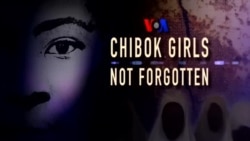More than 200 of the Nigerian schoolgirls abducted a year ago by Boko Haram militants still are missing, and their absence looms large well beyond their African homeland.
But they’re definitely not forgotten, as a Voice of America panel discussion affirmed Tuesday.
The event – at VOA’s Washington headquarters – comes a year after Islamist militants kidnapped 276 girls from a government secondary school overnight between April 14 and 15. "I’m so glad we’re marking this day because you care," said Jamila Fagge, moderator and a reporter with Voice of America’s Hausa service.
In the small studio audience sat Patience Bulus, one of the dozens of Chibok girls who’d escaped the militants. She’s among 10 now studying in the United States.
The kidnapping "sparked worldwide outrage that continues today," said U.S. Representative Karen Bass, a California Democrat who serves on the House Committee on Foreign Affairs.
Bass was among the panelists discussing the fates and futures of the captured girls and their escaped sisters. Others included Representative Frederica Wilson, a Florida Democrat, and panelist Emmanuel Ogebe, whose nonprofit organization brings freed Chibok girls to study in the United States.
That outrage spurred "a swift response" in the United States, which has been committed to freeing the girls, Bass said. The U.S. sent troops to help with intelligence, surveillance and military support in finding the girls, she added.
"We have to do all we can to end the reign of terror of Boko Haram," Bass said, stressing that "while we fight to recover the girls," Nigeria and the international community must defend the rights and education of all young people.
#BringBackOurGirls campaign
Wilson, who wore a red "Bring Back Our Girls" T-shirt under her jacket, pointed out that she's "a school principal by trade." The girls' abduction from a school "was devastating to me," she said, and it mobilized her into action.
Just after their disappearance, Wilson pressed for passage of a House bill condeming the militant group. Within days, she made a fact-finding trip to Nigeria, meeting "with some of the brave young women who escaped, including Patience," as well as many of the girls' relatives.
Their "anguish was overwhelming," she said.
The Chibok kidnappings are among the attrocities cited in a new report from the human rights group Amnesty International, which charges that Boko Haram militants have killed more than 5,500 people and kidnapped at least 2,000 females since early 2014.
While Ogebe worries about the 219 Chibok girls still missing, "the ones who’ve escaped for some reason fell through the cracks," he said.
A lawyer practicing in the United States as a special legal consultant on Nigeria, he launched Education After Escape, an initiative to raise money to give escaped Chibok girls more academic opportunities. Funds are distributed through the Jubiliee Campaign USA.
To date, the initiative has aided 11 young women, its website says.
WATCH: See the "Chibok Girls Not Forgotten" video
Five of the Chibok girls are studying at the Canyonville Christian Academy, a residential high school in Canyonville, Oregon.
Doug Wead, Canyonville's president, said teachers unanimously agreed to bring in the students, absorbing many of the costs themselves despite modest private-school salaries.
The Chibok students are in counseling to cope with the trauma, said Wead, who addressed the audience via Skype. "They have to be taught once again how to reassert themselves without fear ... but the loneliness is passing."
Most of the academy's 115 students are international, and they've embraced the Chibok girls in their midst and those abroad, Wead said. "Tonight, they will light 219 candles," one for each missing girl. He read aloud from a letter prepared by a student group and intended for the captives: "You are not alone, you are not forgotten, and one day the whole world will celebrate your freedom...."
Importance of education
Education is the most potent weapon to prevent abuses, said R. Evon Idahosa, founding director of PathFinders Justice Initiative.
Moving forward will require not only improving minds but changing them, said R. Evon Idahosa, founding director of PathFinders Justice Initiative. It aims to correct injustices to women and girls in the developing world.
The underlying issue is that, in too many cultures, "women are less valuable than men," Idahosa said, participating by phone. She complained of "antiquated thinking that women are chattel and that they can be carted off in the middle of the night."
Idahosa's bottom line: Women won’t be empowered until men are re-educated.
The event included video clips of some of the escaped girls in Nigeria – and a message of hope from Malala Yousafzai, the Pakistani activist who’d nearly been killed by Taliban gunman for promoting female education.
"Stay strong and never lose hope," she’d encouraged the Chibok girls earlier, identifying herself as "your sister, Malala." The teen, who shared the 2014 Nobel Peace Prize for her activism, has a website that encourages writing letters to the missing girls on the anniversary of their disappearance.
LISTEN: From the Malala Fund, Malala reads her open letter to the kidnapped Nigerian schoolgirls
Wilson said the Nigerian government must be held accountable for insufficiently protecting its citizens. "We have to stay on the case," she said.
She, like other speakers cited "promising signs" in Nigeria, including last month's peaceful presidential elections. She voiced hope in President-elect Muhammadu Buhari, the former military dictator voted to succeed Jonathan Goodluck in May.
The Chibok event was organized by Voice of America’s Hausa service, which serves audiences primarily in Nigeria, Ghana and Niger, as well as other neighboring countries. VOA Director David Ensor, in opening the discussion, noted that, "since the night of the abduction, our Hausa service has been a leader" in coverage of the events.







